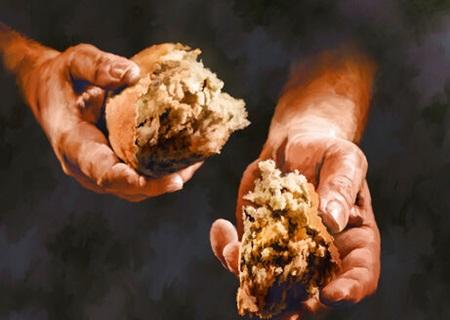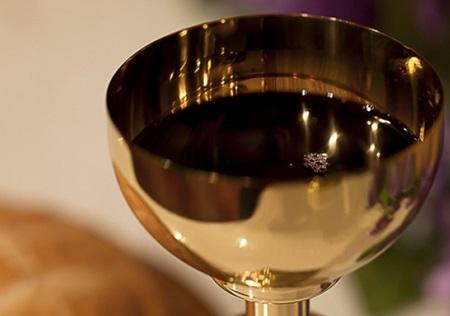Communion: How Frequent?
Communion: How Frequent?
I have taken care to record publicly that our custom is defective, so that those who come after me may be able to correct it more freely and easily.
John Calvin, Calvini Opera, x, I, 213

This was John Calvin's opinion at the end of his life concerning the practice of quarterly communion in Geneva as opposed to his desired “at least weekly” communion.
From the outset of this brief essay, let me say two things: first, I am a staunch advocate of celebrating holy communion every Lord's Day and, second, at the same time I will stand up and defend any consistory's right to determine how often it will administer the Supper to its local congregation. As confessional churches what we confess is the nature of the Supper and not its frequency, however eager I may be to point out the implications of the former for the latter. In short, I agree with Calvin that our practice as Reformed churches is defective and that it should be corrected, but that this is not a confessional issue that ought to divide us. Weekly communion is not of the essence of a true Church although I believe it is the most consistent biblical and confessional position.
The Holy Supper is an Ordinary Part of New Covenant Worship⤒🔗
In this essay I want to focus on the New Testament exegetical support for weekly communion. It would be beneficial to survey the evidence for at-least-weekly-communion in the history of the Church, although this is not the time (Cf. the first two centuries in the Didache, Justin Martyr's First Apology and Tertullian's Apology, as well as later developments in the fourth century and beyond, such as Ambrose's, On the Sacraments, Basil's Epistle 93, and the debate between Radbertus and Ratramnus, who while disagreeing on the nature of the sacrament agreed on its frequency).
“The Breaking of Bread”←↰⤒🔗
The Lord's Supper is a part of the ordinary worship of the New Covenant Church. In Acts 2:42 we read, “And they continued steadfastly in the apostles' doctrine, and in the fellowship, in the breaking of the bread, and in the prayers” (my translation). Acts 2:42-49 describes the life of the early, post-Pentecost Church. We notice that their activities as a congregation were “continual.” Thus their gathering together for preaching, fellowship, the Lord's Supper, and prayers was, as verse 46 says, “daily.”
We also notice that St. Luke uses the definite article “the” before each of the four elements mentioned in verse 42: the apostles' doctrine as opposed to false apostles, the fellowship as opposed to false Church-fellowships, the bread of the Supper, the bread par excellence and not just any bread eaten every day, and the prayers meaning the public, official prayers of the Church. These are the four basic elements of New Covenant worship. The phrase “breaking of the bread” was used as an idiom for the Lord's Supper because it is an allusion to the very actions of Jesus on the Passover night (Cf. Matthew 26:26; Mark 14:22; Luke 22:19, 24:30; 1 Corinthians 10:16, 11:24).

As often as the early Church met they partook of all these four elements. As Calvin said, “For there is not the least doubt that the Sacred Supper was in that era set before the believers every time they met together” (Institutes, 4.17.46). This leads us to conclude that the Lord's Supper is just as ordinary as preaching, prayer, and fellowship. There is nothing about the Supper that makes it more special over and above the other elements. The Puritan Thomas Goodwin argued this when he said that the Lord's Supper was a continual ordinance, such as the preaching of the Word and prayer, in which minimal requirements appeared to be weekly rather than arbitrary. He went on to say that since other continual ordinances such as preaching and prayer appeared to be required during the church's worship on the Lord's Day and were characteristic of distinctly Christian worship, why was the Supper arbitrarily excluded from those things on the Lord's Day when the church gathers to worship? The arguments used to argue for infrequent communion, then, could easily be used to argue for infrequent preaching of the gospel and prayer, lest these things lose something of their “special” qualities by becoming too familiar (Works, 11:388-409; cf. G. Van Dooren, The Beauty of Reformed Liturgy, 39-40).
“Coming Together”←↰⤒🔗
Another line of evidence is the phrase “come together” as a description of Christian worship. Attached to this phrase is the idiom, “to break bread.” We will see that the New Testament describes the Church as “coming together” for the purpose of “breaking bread,” i.e., partaking of the Lord's Supper. In Acts 20:7 we read, “Now on the first day of the week, when the disciples came together to break bread.” What was the purpose of gathering on the Lord's Day? They gathered to eat the Holy Supper. In verses 7, 8, and 11 of Acts 20, the preaching of Paul was joined with the Supper. On this passage, John R. W. Stott comments:
Word and sacrament were combined in the ministry given to the church at Troas, and the universal church has followed suit ever since. For God speaks to his people through his Word both as it is read and expounded from Scripture and as it is dramatized in the two gospel sacraments, baptism and the Lord's Supper … What builds up the church more than anything else is the ministry of God's word as it comes to us through Scripture and Sacrament (that is the right coupling), audibly and visibly, in declaration and drama. The Message of Acts, 321
Notice also how Paul uses this terminology in 1 Corinthians. In 11:17, 18, 20, 33, 34 and 14:23 Paul describes the weekly worship service of the Corinthian Church as a “coming together,” or, as “congregating,” once again as Luke did in Acts. This “coming together” was not any old gathering for fellowship, for as 14:23 says, they came together as the “church” (Gk. ekklesia). The Greek word ekklesia is the New Testament equivalent of the Hebrew qahal, “covenant assembly.” So what was the purpose of “Church,” the “covenant assembly”? It was in order to “eat,” i.e., partake of the Lord's Supper (11:33). But Paul had to rebuke the Corinthians because they were not coming for that purpose. They were coming instead to fulfill their own sinful, un-Christian needs (11:17, 20).
As well, notice that the context of “coming together” in 14:23 is not the Supper, but the preaching of the Word. This is important because Paul uses the same language of gathering on the Lord's Day to say it is for the purpose of preaching and partaking of the Supper (Cf. Acts 20:7-11). Participation in preaching and the Lord's Supper marked the life of the early Church. This is why Reformed liturgical scholar, Hughes Oliphant Old, says:
It is in the meeting together for the purpose of sharing the meal that these individuals become the church, the body of Christ. It is this supper which constitutes the church … the service is called 'the Lord's Supper.' The Lord's Day is distinguished by the fact that it is the day for the celebration of the Lord's Supper at the Lord's Table, sharing all together the Lord's Cup.Worship That Is Reformed According to Scripture, 110
In his exposition of the fourth commandment, Zacharias Ursinus (1534-83) asked the question, “How is the Sabbath kept holy, and who profaned, or what are the works commanded and forbidden on the Sabbath?” Besides preaching, prayer, and offerings for the poor, we are “to use the sacraments according to divine appointment.” Here Ursinus quoted the texts above and said:
The sacraments, also, just as the word, constitute a part of the public worship of God in the church, and are means to stir up and cherish faith and godliness in the faithful. Hence the use of the sacraments is most intimately connected with a proper observance and sanctification of the Sabbath.Commentary on the Heidelberg Catechism, 568

This biblical evidence is the background to the first half of the answer our Catechism gives to how we are to observe the Sabbath
In the first place, that the ministry of the Gospel and schools be maintained; and that I, especially on the day of rest, diligently attend Church to learn the Word of God, to use the Holy Sacraments, to call publicly upon the Lord, and to give Christian alms.
Benefits of More Frequent Communion←⤒🔗
In conclusion, the nature of the Lord's Supper leads to the practice of the Lord's Supper, which, in turn, ought to lead to benefits for our souls. It is because of our sinfulness that “our gracious God, mindful of our insensitivity and weakness, has ordained sacraments” (Belgic Confession, Article 33). We need the Lord's Supper because we are weak in faith and are like the man whose son was demon possessed from childhood and cried out to Jesus, “Lord I believe; help my unbelief” (Mark 9:24) and are like the apostles, who prayed, “Increase our faith” (Luke 17:5).
Therefore, the practical benefits of communing more frequently would be that our faith would be confirmed more often. The Belgic Confession says that God gave us the sacraments “to nourish and sustain our faith” (Art. 33). The Heidelberg Catechism asks, “Since then we are made partakers of Christ and all His benefits by faith only, from where comes this faith? The Holy Spirit works it in our hearts by the preaching of the Gospel, and confirms it by the use of the Holy Sacraments” (Q&A 65).
Another benefit would be that tender consciences would be freed from thinking of the Supper in terms of their worthiness to Christ's giving himself to them because they are unworthy. In 1524 Martin Bucer wrote in the first defense of Reformed worship, the Grund and Ursach; in it he said:
In addition, there are some people who are fearful of participating in the Lord's table because they believe, and they are fearful because of old erroneous belief, that they are not good enough or worthy enough, in spite of the fact that the only requirement for participation in the Lord's Supper is that one should believe he has been redeemed by the death of Christ, and desire only to be strengthened by God in such a faith, and in love for the neighbor (Ch. 7).

Add new comment